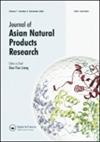潜在肝毒性与何首乌成分含量的相关性分析
IF 1.3
3区 医学
Q3 CHEMISTRY, APPLIED
引用次数: 0
摘要
何首乌是临床常用药物。虽然何首乌的不良反应众所周知,但其潜在的不良反应却往往被忽视。本文旨在阐明何首乌中的肝毒性成分与其各产区之间的关系。这项研究对不同产区的何首乌进行了定性和定量分析,可作为安全使用何首乌的依据。本文章由计算机程序翻译,如有差异,请以英文原文为准。
Correlation analysis between potential hepatotoxicity and ingredient content of polygoni multiflori caulis
Polygoni Multiflori Caulis (PMC) is commonly used in clinical practice. While the adverse reactions of Polygoni Multiflori Radix (RPM) are well-known, the potential adverse reactions of PMC are often neglected. This article aims to clarify the relationship between hepatotoxic components in PMC and its various producing areas. This study provides a qualitative and quantitative analysis of PMC from various regions, which can serve as a basis for safe usage.
求助全文
通过发布文献求助,成功后即可免费获取论文全文。
去求助
来源期刊
CiteScore
3.20
自引率
5.90%
发文量
47
审稿时长
2.3 months
期刊介绍:
The Journal of Asian Natural Products Research (JANPR) publishes chemical and pharmaceutical studies in the English language in the field of natural product research on Asian ethnic medicine. The journal publishes work from scientists in Asian countries, e.g. China, Japan, Korea and India, including contributions from other countries concerning natural products of Asia. The journal is chemistry-orientated. Major fields covered are: isolation and structural elucidation of natural constituents (including those for non-medical uses), synthesis and transformation (including biosynthesis and biotransformation) of natural products, pharmacognosy, and allied topics. Biological evaluation of crude extracts are acceptable only as supporting data for pure isolates with well-characterized structures.
All published research articles in this journal have undergone rigorous peer review, based on initial editor screening and anonymized refereeing by at least two expert referees.

 求助内容:
求助内容: 应助结果提醒方式:
应助结果提醒方式:


